China Arts & Entertainment
Top 10 Overview of China’s Most Popular TV Dramas May 2021
These are the best Chinese TV dramas of the moment.
Published
3 years agoon
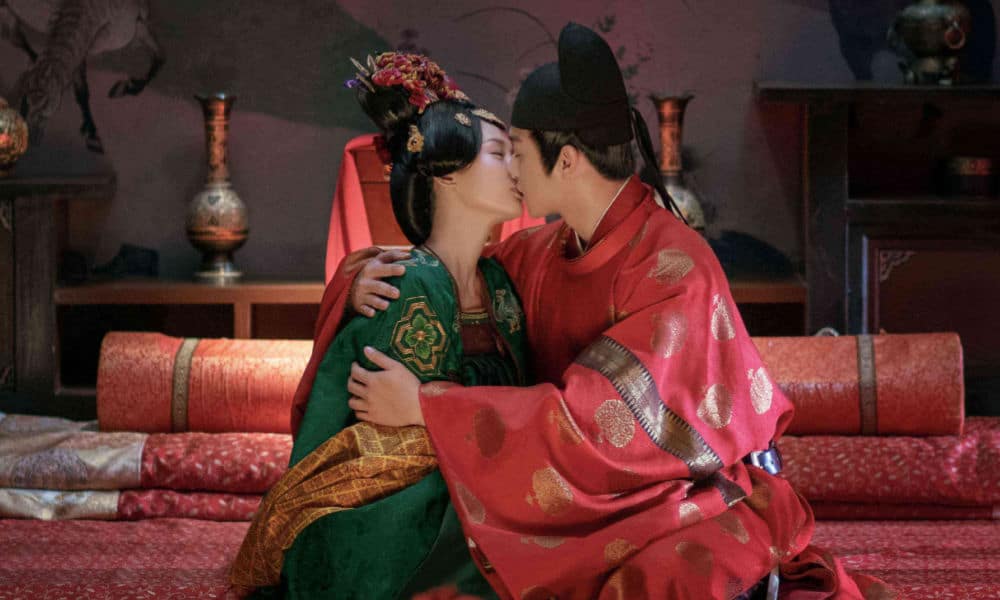
Time to binge-watch. These are some of the most popular TV dramas in China that are trending this 2021 season. An overview by What’s on Weibo.
It has been some time since we have made our last overview of popular Chinese TV dramas to watch this season. It’s high time to give an update on the latest popular TV dramas in China, especially because they recently often become trending topics on social media.
In a year in which China is focusing on its space program and is celebrating the 100th anniversary of the founding of the Communist Party, it is noteworthy that several TV dramas have come out themed around the military and historical topics that are being pushed in recent propaganda efforts.
We compiled a shortlist of China’s top TV dramas based on recent top lists of the leading search and online video platforms, from Baidu to iQiyi and 360kan. This is not an official list, since various platforms have their own hot lists that differ based on the site. We have compiled a top ten based on a combination of the current trending lists, with these ten shows popping up in the top ten lists across various top-ranking charts.
You can find most of the dramas with English subtitles available on YouTube or elsewhere – if so, we have included a link. These are the 10 shows that are trending around Chinese social media in May of 2021!
10. The Glory of Youth (号手就位 Hào shǒu jiù wèi)

- Date: Premiered in April of 2021 on Zhejiang Satellite TV
- Genre: Military Drama (49 episodes)
- Directed by: Li Lu (李路) and Zhang Hanbing (张寒冰)
- Screenplay by: Ying Liangpang (应良鹏), Feng Jie (丰杰), Zu Ruomeng (祖若蒙), Xue Tianzhe (薛天智). Adapted from the novel Getting Enlisted Upon Graduation (毕业了当兵去) by Feng Jie.
- Produced by: Propaganda Bureau of the Chinese People’s Liberation Army, Xi’an Qujiang Film and Television Company
- About: The Glory of Youth is also known under the English title of The Trumpeter in Position. This drama tells the story of four college students joining China’s PLA Rocket Force. It is the first Chinese drama to focus on the Rocket Force.
- Context: This TV series premiered in the same month when a key module of China’s new permanent space station was launched, with Chinese (popular) media increasingly focusing on China’s ambitious space programme.
- Trending: The drama’s premiere was held in Beijing on April 9, with nearly 200 officers and soldiers from the PLARF (People’s Liberation Army Rocket Force) attending the event.
- Link: TLYY (no English subtitles)
9. Word of Honor (山河令 Shānhélìng)
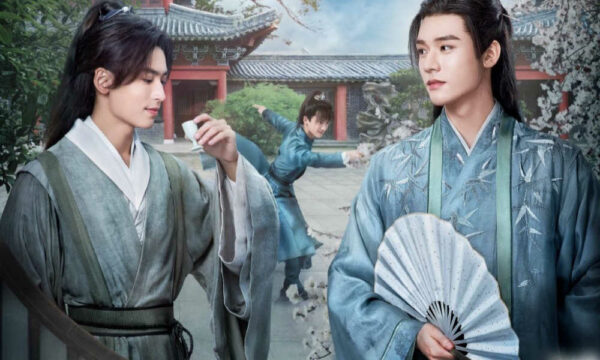
- Date: Premiered in February 22 of 2021
- Genre: Wuxia / Martial arts (36 episodes)
- Directed by: Cheng Zhichao (成志超), Ma Huagan (马华干), Li Hongyu (李宏宇)
- Screenplay by: Xiao Chu (小初), adapted from the danmei wuxia novel Tian Ya Ke (Faraway Wanderers) by Priest.
- Produced by: Ciwen Media, Youku
- About: Word of Honor tells the story of Zhou Zishu (played by Zhang Zhehan 张哲瀚), the leader of the emperor’s special “Window of Heaven” organization who leaves his post to pursue freedom. In doing so, he unwittingly gets involved with the martial world and the Ghost Valley master Wen Kexing (played by Gong Jun 龚俊), who wanders the world, always looking for a fight.
- Context:Word of Honor belongs to the danmei genre. Danmei (耽美) and ‘BL’ (for ‘Boys’ Love’) are umbrella terms for contents of ‘bromance’ or male-male homoerotic fiction (read more here). The Chinese web novel author ‘Priest,’ whose work this TV drama is based on, is among one of the most successful authors within the online BL fiction genre in China.
- Trending: Gong Jun and Zhang Zhehan are super popular as a ‘couple’ among fans of ‘CP’ in Chinese drama. The practice of imagining a relationship between two characters is known as ‘CP,’ an abbreviation for “coupling” or “character pairing.”
- Link: Viki (with English subtitles), also coming to Netflix!
8. Court Lady (骊歌行 Lígē xíng)
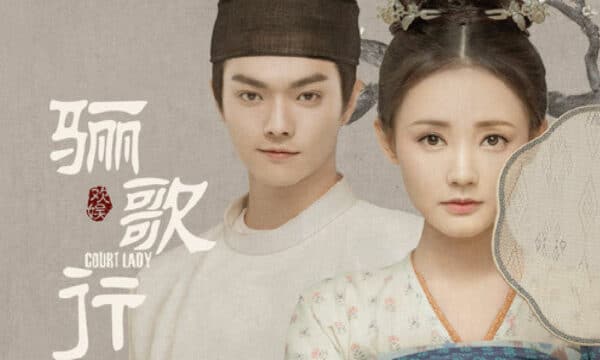
- Date: Premiered April 15 of 2021
- Genre: Costume, drama (55 episodes)
- Directed by: Wang Xiaoming (王晓明), Bai Yunmo (白云默), Shen Zhaoqing (申兆清)
- Screenplay by: Feng Nong (风弄)
- Produced by: Dongyang Huanyu Film Culture Co.
- About: Court Lady features actress Li Yitong (李一桐) and actor Xu Kai (许凯) as Fu Rou and Sheng Chumu. She is a merchant’s daughter, he is the son of the Duke of Lu. When Fu Rou becomes a court lady and Sheng joins the army, their love is put to the test. Their romantic story is set in the Tang Dynasty (618-907).
- Context: Over the past years, historical dramas in China faced difficulties due to tightening regulations on TV series distorting history and having a “bad influence on teens.” Dramas such as Court Lady but also The Long Ballad have been celebrated by state media for their “appealing storyline” and “positive messages” about China.
- Trending: The drama’s costume design is praised for its accuracy and beauty. Over 3000 costumes were designed for this production.
- Link: Viki (with English subtitles)
7. Octogenarian and The 90s (八零九零 Bā líng jiǔ líng)
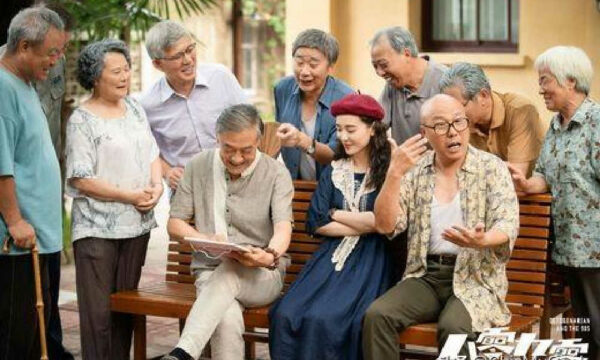
- Date: Premiered April 21 of 2021 on Hunan TV
- Genre: City, Family Drama (39 episodes)
- Directed by: Xu Jizhou (徐纪周) and Yi Jun (易军)
- Screenplay by: Long Zhenyu (龙振宇), Zhu Junyi (朱俊懿), Wu Yu’er (邬雩儿)
- Produced by: Zhejiang Huace Film & TV, Xiangxiang Shidai Entertainment, Beijing HualuBaina Film & TV Company, Haining Yueliang Kaihua, Beijing Leben
- About: “Sunshine Home” is the nursing home founded by Grandma Lin, the grandmother of the carefree millennial girl Ye Xiaomei (played by Wu Qian 吴倩). Carefree, until her grandmother becomes terminally ill and hands the nursing home over to Ye, who learns more from the elderly in the home than she could have ever imagined.
- Context: As China is dealing with a rapidly ageing population, there is an increased media focus on the lives and struggles of the elderly.
- Trending: Although this show is among the most popular TV dramas in China at the moment, it has also received criticism for being too superficial.
- Link: YouTube (with English subtitles)
6. Faith Makes Great (理想照耀中国 Lǐxiǎng Zhàoyào Zhōngguó)
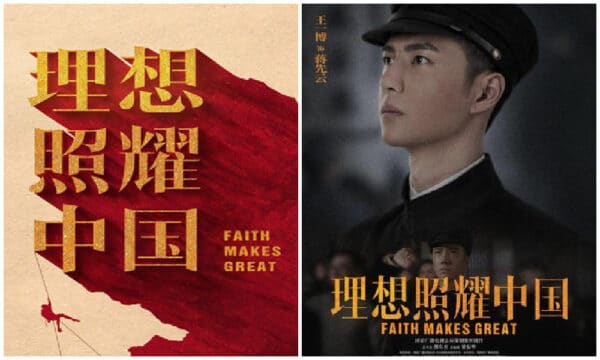
- Date: Premiered on May 5th of 2021
- Genre: Period drama (40 episodes)
- Directed by: Fu Dongyu (傅东育), who previously won an award for the drama Phurbu & Tenzin.
- Screenplay by: Liang Zhenhua (梁振华)
- Produced by: Hunan TV
- About: Faith Makes Great is a Chinese TV series based on true stories that happened throughout hundred years of communism in China. The drama is an initiative of China’s State Administration of Radio and Television to celebrate the 100th anniversary of the founding of the Chinese Communist Party.
- Context: 2021 is the year the Chinese Communist Party turns 100. This is one of the TV dramas commemorating the founding of the Party.
- Trending: One of the episodes of this series features the super popular Chinese celebrity Wang Yibo.
- Link: YouTube (with English subtitles)
5. Douluo Continent (斗罗大陆 Dòuluō Dàlù)
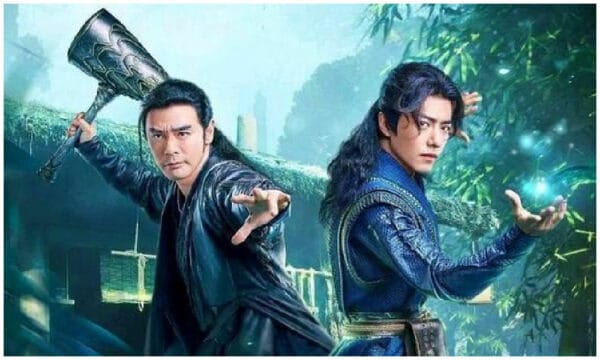
- Date: Premiered on February 5th of 2021
- Genre: Fantasy / Adventure (40 episodes)
- Directed by: Yang Zhenyu (杨振宇)
- Screenplay by: Wang Juan (王倦)
- Produced by: Tencent, New Classics Media, Xuanshi Tangmen, Dashenquan
- About: Douluo Continent was adapted from a fantasy novel by the same name written by Tang Jia San Shao (唐家三少). It tells the story of Tang San, played by the ever-popular Chinese celebrity Xiao Zhan. Tang San lost his mother as a child and becomes friends with another orphan named Xiao Wu (Betty Wu) while he is in training to be a Spirit Master. With his rare talents, Tang overcomes many difficulties while growing older and embarking on his journey.
- Trending: The producers of Douluo Continent issued an apology earlier this year for plagiarizing British TV series His Dark Materials and a role within the computer game League of Legends in the opening scene of the drama.
- Link: YouTube (with English subtitles)
4. My Treasure (生活家 Shēnghuó Jiā)

- Date: Premiered on May 13 of 2021
- Genre: City Drama (35 episodes)
- Directed by: Liu Haibo (刘海波), who also directed the 2019 show In the Name of the Law (and many others)
- Screenplay by: Teng Yang (滕洋)
- Produced by: iQiyi, Yuanshi Pictures, Tomorrow Film
- About: My Treasure follows the life of fresh graduate Qiu Dongna (Vicky Chen) and the struggles she faces while starting up her career and dealing with the people thwarting her plans.
- Context: Over recent years there has been a rise in Chinese TV dramas with a strong female leading role.
- Trending: The main role of this show, Qiu Dongna (邱冬娜), has won the hearts of many netizens on Chinese social media.
- Link: YouTube (with English subtitles)
3. Dancing in the Storm (风暴舞 Fēngbào Wǔ)

- Date: Premiered April 25th of 2021
- Genre: City, Spy drama (43 episodes)
- Directed by: Liu Xin (刘新), who also directed the 2020 hit show Hunting (猎狐)
- Screenplay by: An Zhiyong (安志勇) and Fu Li (傅莉)
- Produced by: Ciwen Media, iQiyi, Manmei Film
- About: Dancing in the Storm focuses on Clark Li Junjie (William Chan 陈伟霆) who works at an information security company where he accidentally discovers the company’s dangerous dealings with external parties. This discovery is the start of an investigation into a complicated web of intrigue.
- Context: This show should not be confused with another one with a similar title, namely Storm Eye (暴风眼), which is also a 2021 drama. That Chinese ‘national security’ drama came under fire for “overly dramatic plotlines.”
- Trending: The Weibo hashtag page of this drama (#风暴舞#) has by now received over 260 million views on Weibo.
- Link: YouTube (no English subtitles)
2. Awakening Age (觉醒年代 Juéxǐng Niándài)
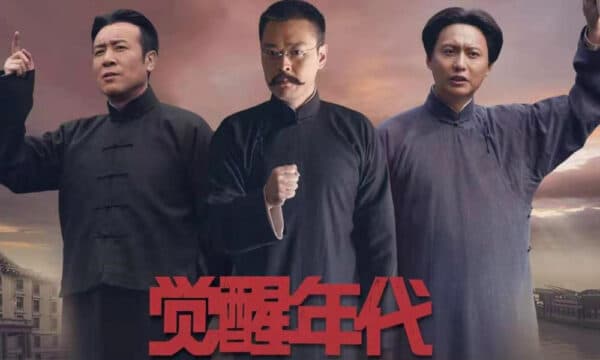
- Date: Premiered in February of 2021 on CCTV
- Genre: “Red drama”, Revolutionary historical drama (43 episodes)
- Directed by: Zhang Yongxin (张永新)
- Screenplay by: Long Pingping (龙平平)
- Produced by: CCTV
- About: Awakening Age tells the story of how the Party was founded, focusing on the events taking place in between 1916 and 1921.
- Context: 2021 is the year the Chinese Communist Party turns 100. This is one of the TV dramas commemorating the founding of the Party.
- Trending: Awakening Age has a hashtag page on Weibo (initiated by CCTV) that by now has received over 590 million views.
- Link: YouTube (no English subtitles)
1. A Love for Dilemma (小舍得 Xiǎo Shědé)

- Date: Produced in 2020 and premiered on iQiyi on April 11, 2021
- Genre: Family drama (42 episodes)
- Directed by: Zhang Xiaobo (张晓波), who also directed hit show Nothing But Thirty (三十而已, 2020)
- Screenplay by: Zhou Yifei (周艺飞)
- Produced by: iQiyi and Linmon Pictures
- About: This season’s super popular TV drama A Love for Dilemma is themed around family, parenting, and China’s competitive education system. In the series, two stepsisters compete against each other over the school results of their children. The family’s ‘grandpa’, played by famous actor Zhang Guoli (张国立), tries to create harmony around the dinner table between his daughter and stepdaughter, but the rivalry between the two and how they raise their children intensifies nevertheless. While stepsister Tian Yulan urges her little son to work hard in school and focus on his grades so that he can go to the best high school and university, sister Nan Li places more emphasis on the general development of her children and wants them to enjoy their childhood. Both mothers, however, question their own choices when facing challenges with how their children perform at school.
- Context: One of the reasons this drama is so popular in China right now is because of its depiction of the competitive education system and parent-child relationships of ordinary Chinese families.
- Trending: A Love for Dilemma ignited discussions on the term of ‘involution’ on Chinese social media (read more here), especially when discussing China’s education system, where competition starts as early as kindergarten and the pressure on children to succeed in the ‘gaokao’ college entrance exam starts many years before it takes place.
- Link: iQiyi (including subtitles)
Wanna read more on Chinese tv dramas? Check our other articles here.
By Manya Koetse
Follow @whatsonweibo
Spotted a mistake or want to add something? Please let us know in comments below or email us. First-time commenters, please be patient – we will have to manually approve your comment before it appears.
©2021 Whatsonweibo. All rights reserved. Do not reproduce our content without permission – you can contact us at info@whatsonweibo.com.
Manya Koetse is the founder and editor-in-chief of whatsonweibo.com. She is a writer, public speaker, and researcher (Sinologist, MPhil) on social trends, digital developments, and new media in an ever-changing China, with a focus on Chinese society, pop culture, and gender issues. She shares her love for hotpot on hotpotambassador.com. Contact at manya@whatsonweibo.com, or follow on Twitter.

China Arts & Entertainment
Singing Competition or Patriotic Fight? Hunan TV’s ‘Singer 2024’ Stirs Nationalistic Sentiments
“I’m in Zibo eating barbecue, I really don’t feel like listening to Alicia Keys.” Hunan TV’s ‘Singer 2024’ has set off a new wave of national pride in China’s music and performers.
Published
2 months agoon
May 17, 2024By
Ruixin Zhang
Besides memes and jokes, Hunan TV’s ‘Singer 2024’ has set off a new wave of national pride in China’s music and performers on Chinese social media.
In May, while the whole of Europe was gripped by the Eurovision Song Contest frenzy, Chinese audiences were eagerly anticipating the return of their own beloved singing competition, Singer 2024 (@湖南卫视歌手), formerly known as I Am a Singer (我是歌手).
The show, introduced from South Korea’s MBC Television and popular in China since 2013, only features professional singers who have already made a name for themselves.
Rather than watching unknown aspiring singers who are hoping to be discovered in many singing competitions, such as Sing! China, Singer 2024 gives audiences a show filled with professional and often stunning show performances by established names in the entertainment industry.
Since 2013, renowned singers from China and abroad have appeared on the show, including Chinese vocalist Tan Jing (谭晶), British pop singer Jessie J, and the late Hong Kong pop diva Coco Lee. However, no season managed to create as many waves as the 2024 season did, dominating all social media trending topics overnight.
So, what exactly happened?
COMPETING WITH FOREIGNERS
“The difference between the Grammys and the Strawberry Musical Festival”
In early May, the pre-show promotion of Singer 2024 was already buzzing on Chinese social media after a list of featured singers appeared on Weibo, including big names such as American singer-songwriter Bruno Mars, Korean-New Zealand singer Rosé from Blackpink, and Japanese diva LiSA.
Although Singer previously had many foreign singers on the show, this international celebrity lineup still caused a stir.
On the day of the first episode, only two foreign singers were announced to appear on the show: young Moroccan-Canadian singer Faouzia and the Grammy-nominated American singer-songwriter Chanté Moore. The other contestants were all Chinese singers who are already well-known among Chinese audiences. Because many people were unfamiliar with the two foreign singers, they joked that the winner of this season was already set in stone; surely it would be the famous Chinese singer Na Ying (那英), known for her beautiful voice.
However, that first episode surprised everyone as the two foreign singers, Faouzia and Chanté Moore, showed outstanding vocal skills. This not only startled many viewers but also made the Chinese contestants uneasy. Several experienced Chinese singers apparently were so unnerved after watching Faouzia and Chanté Moore’s performance that their voices trembled when singing.

Since the show was broadcast live – without post-production editing or autotune – audiences got to hear the actual vocal capabilities and see performers’ genuine reactions. It seemed undeniable that the foreign contestants did much better in terms of vocals and stage presence than the Chinese ones. Some online commenters even said that the gap between Chinese and foreign singers’ levels was like “the difference between the Grammys and the Strawberry Musical Festival” [a local Chinese music festival].
Chinese online influencer Yongkai (@陈咏开165) shared screenshots of Chanté Moore’s backstage reactions during the show. The American celebrity seemed puzzled when hearing the somewhat underwhelming performance by Chinese singer Yang Chenglin (楊丞琳), and she appeared much more positive when Na Ying sang.

This noteworthy scene, coupled with Chanté’s comments during an interview saying that she thought the Chinese production team had invited her on the show to be a judge, turned the entire show into a display of foreign singers outshining the Chinese contestants.
By the end of the first episode, Chanté Moore and Faouzia unsurprisingly ranked first and second, with Na Ying in third place.

After the show, some online commenters jokingly pointed out that Na Ying, being of Manchu descent like the rulers of China during the Qing Dynasty, showed some similarities to Empress Dowager Cixi’s defiance against Western colonizers in the way she “single-handedly took up against on foreigners” on the show.
They humorously turned Na Ying’s expressions into memes resembling Empress Dowager Cixi from an old Chinese TV show, with captions like “I want the foreigners dead” (“我要洋人死”).

Others suggested finding better Chinese singers for the show who could compete with Faouzia and Moore.
“SINGING WELL” CULTURALLY COLONIZED?
“I’m in Zibo eating BBQ, I really don’t want to listen to Alicia Keys.”
Initially, discussions about the show were light-hearted and humorous, until some netizens who couldn’t appreciate the jokes began to dampen the mood and made online discussions more serious.
Zou Xiaoying (@邹小樱), a music critic with nearly two million followers, posted on social media after the show, stating that he would have never voted for Chanté Moore or Faouzia. Not only did Zou question their vocal talent, he also wondered if the aesthetic of Chinese listeners had been influenced by Western music taste to such an extent that it has been “culturally colonized” (“文化殖民”). Meanwhile, he praised the members of Beijing rock band Second Hand Rose as “national heroes” (“民族英雄”).
He wrote:
If I had three votes for the first episode of “Singer 2024,” I’d vote for Second Hand Rose, Na Ying, and Silence Wang [note: Chinese singer-songwriter and record producer Wang Sushuang 汪苏泷]. The reason I wouldn’t vote for Chanté Moore or Faouzia is because — do they actually sing so well?
Has our definition of “singing well” perhaps been colonized? Just as our modern-day use of Chinese has little to do with our classical Chinese poems, with the foundation of modern Chinese actually being translations from the 20th century, is this also a form of ‘cultural colonization’?
You must think I’m talking nonsense again. But when I listen to Chanté Moore singing “If I Ain’t Got You,” I find it too boring. I know her singing is “good,” but this “good” has nothing to do with me. If, for Chinese listeners, Chanté Moore’s “good” is the standard, then is that what we in the music industry should be working towards? Isn’t that funny? When you open QQ Music or NetEase Cloud Music, and it recommends these songs to you every day, won’t you be convinced to practice again?
Of course, I know Chanté Moore is in good shape, very relaxed. Actually all of the Chinese singers tonight were very nervous. Yang Chenglin (杨丞琳) was nervous, Na Ying was also nervous. Even a seemingly carefree band like Second Hand Rose, if you listened to the introduction of their song, [you’ll find] they were so nervous that Yao Lan, supposedly “China’s No.1 Guitarist”, was so nervous that he hit the wrong note. It was not even a fast-paced solo (…), how nervous could he be? When everyone’s so tense, the confidence of Chanté Moore and Faouzia is indeed something that East Asia can’t match. In East-Asian [entertainment] circles, represented by China/Japan/Korea, our different cultural habits, upbringing, and ethnic characteristics have made it so that we don’t possess these kinds of singing abilities, even including our ways of emotional expression. I don’t know from which season it started with ‘Singer’ – and if it’s some kind of Catfish Effect (鲶鱼效应 ) – that they brought international singers with different cultural backgrounds into the competition. But this isn’t the Olympics, it’s not like Liu Xiang [刘翔, Chinese gold medal hurdler] is going to defeat opponents from the United States or Cuba. “I’m in Zibo eating barbecue, I really don’t feel like Alicia Keys.” (This line is not mine, I stole it from my WeChat friend).
Because of this, I find Second Hand Rose even more rare and precious. It’s just like I used to love asking: If you could only recommend one Chinese band to your foreign friends, which one would you recommend? Some say it’s New Pants (新裤子), some say it’s Omnipotent Youth Society, but my answer will always be Second Hand Rose. ‘The drama of Monkey King is a national treasure,’ its light will always shine. Facing the gunfire of Western powers, Second Hand Rose is standing on the frontline, they are our national heroes. Indeed, the band itself was nervous, (..), but when Chanté Moore goes off like a singing dolphin, we are fortunate to have Second Hand Rose at the frontline; the Chinese sons and daughters are building the Great Wall of Music of flesh and blood.
Because of this, I find Second Hand Rose even more rare and precious. It’s just like I used to love asking: If you could only recommend one Chinese band to your foreign friends, which one would you recommend? Some say it’s New Pants (新裤子), some say it’s Omnipotent Youth Society, but my answer will always be Second Hand Rose. ‘The drama of Monkey King is a national treasure,’ its light will always shine. Facing the gunfire of Western powers, Second Hand Rose is standing on the frontline, they are our national heroes. Indeed, the band itself was nervous, (..), but when Chanté Moore goes off like a singing dolphin, we are fortunate to have Second Hand Rose at the frontline; the Chinese sons and daughters are building the Great Wall of Music of flesh and blood.
Anyway, no matter if they’re strong or not, I would never vote for the foreigner.
The comment about ‘I’m in Zibo eating barbecue, I really don’t feel like [listening to] Alicia Keys’ refers to the craze surrounding China’s ‘BBQ town’ Zibo. In Zibo, Chinese visitors like to sing, drink beer, and enjoy food together; it’s a simple and modest way of appreciating life and music, which contrasts with slick and smooth American or foreign styles of performing and singing.
Whether Zou’s criticism was for attention or genuine sentiment, it shifted the focus of the discussion from music to patriotism.
CHINESE SINGERS WITH MILITARISTIC UNDERTONES
“I volunteer to join the battle”
Amidst all this, some netizens, easily swayed by nationalist sentiments, began to seek help from the “national team” (国家队) of singers — musicians employed by national-level arts troupes — to “bring glory to the nation” and teach the foreigners a lesson. Some even questioned the intentions of the Singer 2024 TV show in inviting foreign singers to participate.
On May 12th, renowned Chinese singer and philanthropist Han Hong (韩红) posted on Weibo, fueling a wave of sentiment and support. In her post, Han Hong declared, “I am Chinese singer Han Hong, and I volunteer to join the battle,” tagging the production team of the TV show. Her invitation to join the battle quickly went viral.

Han Hong meme: “Who called for me?”
Han Hong has significant influence in the Chinese music industry and society as a whole. Her usual serious demeanor and avoidance of internet pop culture made netizens unsure whether she was joking or serious. Nevertheless, regardless of her intentions, a group of well-known singers began to volunteer via Weibo, emphasizing their identity as “Chinese singers” and using phrases with strong militaristic undertones like “fighting for the country” and “answering the call.”
Although many enjoyed this new wave of national pride in Chinese music and performers, some netizens criticized the trend of transforming an entertainment show into a nationalistic competition.
Film critic He Xiaoqin (何小沁) stated, “It’s okay to take the Qing-Dynasty-fighting-foreigners comparison as a joke, but taking it too seriously in today’s context is absurd.”
Others expressed fatigue with how quickly topics on Chinese internet platforms escalate to patriotic sentiments. To bring the focus back to entertainment, they turned “I volunteer to join the battle” (#我请战#) into a new internet catchphrase.
In response, the production team of Singer 2024 released a statement on Weibo, thanking all the singers for their self-recommendations. They emphasized the show’s competitive structure but clarified that “winning” is just one part of a singer’s journey..but that the love of music goes beyond all in connecting people, no matter where they’re from.
By Ruixin Zhang, edited with further input by Manya Koetse
Independently reporting China trends for over a decade. Like what we do? Support us and get the story behind the hashtag by subscribing:
Spotted a mistake or want to add something? Please let us know in comments below or email us. First-time commenters, please be patient – we will have to manually approve your comment before it appears.
©2024 Whatsonweibo. All rights reserved. Do not reproduce our content without permission – you can contact us at info@whatsonweibo.com.
China Arts & Entertainment
“Old Bull Eating Young Grass”: 86-Year-Old Chinese Painter Fan Zeng Marries 36-Year-Old Xu Meng
Online reactions to the news of Fan’s marriage to Xu Meng, his fourth wife, reveal that the renowned artist is not particularly well-liked among Chinese netizens.
Published
3 months agoon
April 18, 2024
The recent marriage announcement of the renowned Chinese calligrapher/painter Fan Zeng and Xu Meng, a Beijing TV presenter 50 years his junior, has sparked online discussions about the life and work of the esteemed Chinese artist. Some netizens think Fan lacks the integrity expected of a Chinese scholar-artist.
Recently, the marriage of a 86-year-old Chinese painter to his bride, who is half a century younger, has stirred conversations on Chinese social media.
The story revolves around renowned Chinese artist, calligrapher, and scholar Fan Zeng (范曾, 1938) and his new spouse, Xu Meng (徐萌, 1988). On April 10, Fan announced their marriage through an online post accompanied by a picture.
In the picture, Fan is seen working on his announcement in calligraphic form.

Fan Zeng announces his marriage on Chinese social media.
In his writing, Zeng shares that the passing of his late wife, three years ago, left him heartbroken, and a minor stroke also hindered his work. He expresses gratitude for Xu Meng’s care, which he says led to his physical and mental recovery. Zeng concludes by expressing hope for “everlasting harmony” in their marriage.
Fan Zeng is a calligrapher and poet, but he is primarily recognized as a contemporary master of traditional Chinese painting. Growing up in a well-known literary family, his journey in art began at a young age. Fan studied under renowned mentors at the Academy of Fine Arts in Beijing, including Wu Zuoren, Li Keran, Jiang Zhaohe, and Li Kuchan.
Fan gained global acclaim for his simple yet vibrant painting style. He resided in France, showcased his work in numerous exhibitions worldwide, and his pieces were auctioned at Sotheby’s and Christie’s in the 1980s.[1] One of Fan’s works, depicting spirit guardian Zhong Kui (钟馗), was sold for over 6 million yuan (828,000 USD).

Zhong Kui in works by Fan Zeng.
In his later years, Fan Zeng transitioned to academia, serving as a lecturer at Nankai University in Tianjin. At the age of 63, he assumed the role of head of the Nankai University Museum of Antiquities, as well as holding various other positions from doctoral supervisor to honorary dean.
By now, Fan’s work has already become part of China’s twentieth-century art history. Renowned contemporary scholar Qian Zhongshu once remarked that Fan “excelled all in artistic quality, painting people beyond mere physicality.”
A questionable “role model”
Fan’s third wife passed away in 2021. Later, he got to know Xu Meng, a presenter at China Traffic Broadcasting. Allegedly, shortly after they met, he gifted her a Ferrari, sparking the beginning of their relationship.

A photo of Xu and her Hermes Birkin 25 bag has also been making the rounds on social media, fueling rumors that she is only in it for the money (the bag costs more than 180,000 yuan / nearly 25,000 USD).
On Weibo, reactions to the news of Fan’s marriage to Xu Meng, his fourth wife, reveal that the renowned artist is not particularly well-liked among netizens. Despite Fan’s reputation as a prominent philanthropist, many perceive his recent marriage as yet another instance of his lack of integrity and shamelessness.

Fan Zeng and Xu Meng. Image via Weibo.
One popular blogger (@好时代见证记录者) sarcastically wrote:
“Warm congratulations to the 86-year-old renowned contemporary erudite scholar and famous calligrapher Fan Zeng, born in 1938, on his marriage to Ms Xu Meng, a 50 years younger 175cm tall woman who is claimed to be China’s number one golden ratio beauty. Mr Fan Zeng really is a role model for us middle-aged greasy men, as it makes us feel much less uncomfortable when we’re pursuing post-90s youngsters as girlfriends and gives us an extra shield! Because if contemporary Confucian scholars [like yourself] are doing this, then we, as the inheritors of Confucian culture, can surely do the same!“
Various people criticize the fact that Xu Meng is essentially just an aide to Fan, as she can often be seen helping him during his work. One commenter wrote: “Couldn’t he have just hired an assistant? There’s no need to turn them into a bed partner.”
Others think it’s strange for a supposedly scholarly man to be so superficial: “He just wants her for her body. And she just wants him for his inheritance.”
“It’s so inappropriate,” others wrote, labeling Fan as “an old bull grazing on young grass” (lǎoniú chī nèncǎo 老牛吃嫩草).
Fan is not the only well-known Chinese scholar to ‘graze on young grass.’ The famous Chinese theoretical physicist Yang Zhenning (杨振宁, 1922), now 101 years old, also shares a 48-year age gap with his wife Weng Fen (翁帆). Fan, who is a friend of Yang’s, previously praised the love between Yang and Weng, suggesting that she kept him youthful.

Older photo posted on social media, showing Fan attending the wedding ceremony of Yang Zhenning and his 48-year-younger partner Weng Fen.
Some speculate that Fan took inspiration from Yang in marrying a significantly younger woman. Others view him as hypocritical, given his expressions of heartbreak over his previous wife’s passing, and how there’s only one true love in his lifetime, only to remarry a few years later.
Many commenters argue that Fan Zeng’s conduct doesn’t align with that of a “true Confucian scholar,” suggesting that he’s undeserving of the praise he receives.
“Mr. Wang from next door”
In online discussions surrounding Fan Zeng’s recent marriage, more reasons emerge as to why people dislike him.
Many netizens perceive him as more of a money-driven businessman rather than an idealistic artist. They label him as arrogant, critique his work, and question why his pieces sell for so much money. Some even allege that the only reason he created a calligraphy painting of his marriage announcement is to profit from it.
Others cast doubt on his status as a Chinese calligraphy ‘grandmaster,’ noting that his calligraphy style is not particularly impressive and may contain typos or errors. His wedding announcement calligraphy appears to blend traditional and simplified characters.

Netizens have pointed out what looks like errors or typos in Fan’s calligraphy.
Another source of dislike stems from his history of disloyalty and his feud with another prominent Chinese painter, Huang Yongyu (黄永玉). Huang, who passed away in 2023, targeted Fan Zeng in some of his satirical paintings, including one titled “When Others Curse Me, I Also Curse Others” (“人骂我,我亦骂人”). He also painted a parrot, meant to mock Fan Zeng’s unoriginality.

Huang Yongyu made various works targeting Fan Zeng.
In retaliation, Fan produced his own works mocking Huang, sparking an infamous rivalry in the Chinese art world. The two allegedly almost had a physical fight when they ran into each other at the Beijing Hotel.

Fan Zeng mocked Huang Yongyu in some of his works.
Fan and Huang were once on good terms though, with Fan studying under Huang at the Central Academy of Fine Arts in Beijing. Through Huang, Fan was introduced to the renowned Chinese novelist Shen Congwen (沈从文, 1902-1988), Huang’s first cousin and lifelong friend. As Shen guided Fan in his studies and connected him with influential figures in China’s cultural circles, their relationship flourished.
However, during the Cultural Revolution, when Shen was accused of being a ‘reactionary,’ Fan Zeng turned against him, even going as far as creating big-character posters to criticize his former mentor.[2] This betrayal not only severed the bond between Shen and Fan but also ended Fan’s friendship with Huang, and it is still remembered by people today.
Fan Zeng’s behavior towards another former mentor, the renowned painter Li Kuchan (李苦禪, 1899-1983), was also controversial. Once Fan gained fame, he made it clear that he no longer respected Li as his teacher. Li later referred to Fan as “a wolf in sheep’s clothes,” and apparently never forgave him. Although the exact details of their falling out remain unclear, some blame Fan for exploiting Li to further his own career.
There are also some online commenters who call Fan Zeng a “Mr Wang from next door” (隔壁老王), a term jokingly used to refer to the untrustworthy neighbor who sleeps with one’s wife. This is mostly because of the history of how Fan Zeng met his third wife.
Fan’s first wife was the Chinese female calligrapher Lin Xiu (林岫), who came from a wealthy family. During this marriage, Fan did not have to worry about money and focused on his artistic endeavours. The two had a son, but the marriage ended in divorce after a decade. Fan’s second wife was fellow painter Bian Biaohua (边宝华), with whom he had a daughter. It seems that Bian loved Fan much more than he loved her.
It is how he met his third wife that remains controversial to this day. Nan Li (楠莉), formerly named Zhang Guiyun (张桂云), was married to performer Xu Zunde (须遵德). Xu was a close friend of Fan, and helped him out when Fan was still poor and trying to get by while living in Beijing’s old city center.
Wanting to support Fan’s artistic talent, Xu let Fan Zeng stay over, supported him financially, and would invite him for meals. Little did he know that while Xu was away to work, Fan enjoyed much more than meals alone; Fan and Xu’s wife engaged in a secret decade-long affair.
When the affair was finally exposed, Xu Zunde divorced his wife. Still, they would use his house to meet and often locked him out. Three years later, Nan Li officially married Fan Zeng. Xu not only lost his wife and friend but also ended up finding his house emptied, his two sons now bearing Fan’s surname.
When Nan Li passed away in 2021, Fan Zeng published an obituary that garnered criticism. Some felt that the entire text was actually more about praising himself than focusing on the life and character of his late wife, with whom he had been married for forty years.

Fan Zeng and his four wives
An ‘old pervert’, a ‘traitor’, a ‘disgrace’—there are a lot of opinions circulating about Fan that have come up this week.
Despite the negativity, a handful of individuals maintain a positive outlook. A former colleague of Xu Meng writes: “If they genuinely like each other, age shouldn’t matter. Here’s to wishing them a joyful marriage.”
By Manya Koetse
[1]Song, Yuwu. 2014. Biographical Dictionary of the People’s Republic of China. United Kingdom: McFarland & Company, 76.
[2]Xu, Jilin. 2024. “Xu Jilin: Are Shen Congwen’s Tears Related to Fan Zeng?” 许纪霖:沈从文的泪与范曾有关系吗? The Paper, April 15. https://www.thepaper.cn/newsDetail_forward_27011031. Accessed April 17, 2024.
Independently reporting China trends for over a decade. Like what we do? Support us and get the story behind the hashtag by subscribing:
Spotted a mistake or want to add something? Please let us know in comments below or email us. First-time commenters, please be patient – we will have to manually approve your comment before it appears.
©2024 Whatsonweibo. All rights reserved. Do not reproduce our content without permission – you can contact us at info@whatsonweibo.com.
Subscribe

Weibo Watch: The Future is Here

“Bye Bye Biden”: Biden’s Many Nicknames in Chinese

Enjoying the ‘Sea’ in Beijing’s Ditan Park

A Triumph for “Comrade Trump”: Chinese Social Media Reactions to Trump Rally Shooting

Weibo Watch: Get Up, Stand Up

The Tragic Story of “Fat Cat”: How a Chinese Gamer’s Suicide Went Viral

“Old Bull Eating Young Grass”: 86-Year-Old Chinese Painter Fan Zeng Marries 36-Year-Old Xu Meng

A Brew of Controversy: Lu Xun and LELECHA’s ‘Smoky’ Oolong Tea

Singing Competition or Patriotic Fight? Hunan TV’s ‘Singer 2024’ Stirs Nationalistic Sentiments

Zara Dress Goes Viral in China for Resemblance to Haidilao Apron

Weibo Watch: The Battle for the Bottom Bed

About the “AI Chatbot Based on Xi Jinping” Story

China’s Intensified Social Media Propaganda: “Taiwan Must Return to Motherland”

Weibo Watch: Telling China’s Stories Wrong

Saying Goodbye to “Uncle Wang”: Wang Wenbin Becomes Chinese Ambassador to Cambodia
Get in touch
Would you like to become a contributor, or do you have any tips or suggestions? Get in touch here!
Popular Reads
-

 China Insight3 months ago
China Insight3 months agoThe Tragic Story of “Fat Cat”: How a Chinese Gamer’s Suicide Went Viral
-

 China Music4 months ago
China Music4 months agoThe Chinese Viral TikTok Song Explained (No, It’s Not About Samsung)
-

 China Digital10 months ago
China Digital10 months agoToo Sexy for Weibo? Online Discussions on the Concept of ‘Cābiān’
-

 China Arts & Entertainment12 months ago
China Arts & Entertainment12 months agoBehind 8 Billion Streams: Who is Dao Lang Cursing in the Chinese Hit Song ‘Luocha Kingdom’?






LIHAN
May 23, 2021 at 3:17 pm
确实很专业的网站,加油!
Thiughts and Writings
July 23, 2021 at 3:49 am
I love The Long Ballad more than any of these drama listed here. And Ashile Sun is an iconic character justified by Leo Wu’s awesome portrayal.
Raine
September 15, 2021 at 11:03 am
Word of Honour is hands down my favourite drama this year.
Douluo Continent I was enjoying till I realised there were not enough episodes left to finish the story so I didn’t bother finishing it.
Will keep an eye out for Court Lady on my apps … love Xu Kai.